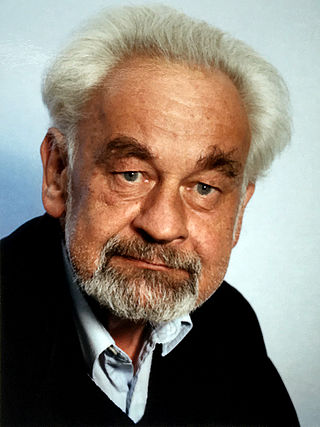Harald Holz (born 14 May 1930, in Freiburg im Breisgau) is a German philosopher, logician, mathematician (autodidact), poet and novelist.
Harald Holz (born 14 May 1930, in Freiburg im Breisgau) is a German philosopher, logician, mathematician (autodidact), poet and novelist.
Holz studied philosophy from 1953 to 1957 in Pullach im Isartal/Germany (lic. phil. schol.) and from 1959 until 1961 Catholic Theology at the Johann Wolfgang Goethe University Frankfurt/Germany (bac. theol.). He continued his study of philosophy at the Rheinische Friedrich-Wilhelms University Bonn/Germany. There he received his research doctorate in 1964 with Gottfried Martin with the thesis Transcendental philosophy and metaphysics. [1]
Since 1964 he was assistant professor at the Institute of Philosophy at Ruhr University Bochum/Germany. In 1969 he published his Second Book with the university entitled Speculation and Facticity. On middle-aged and late Schelling's concept of freedom. [2] Since 1971 he was Research Associate and Professor with Ruhr University Bochum. Since 1976 he was Chair Professor and Director of the Institute of Fundamental Philosophical-Theological Questions at the Westfalian Wilhelm University Münster/Germany. In 1979 and in 1983 he was visiting scholar at George Washington University in Washington D.C. Further he was director, together with E. Wolf-Gazo, implementing the first Inter-national Congress on the Philosophy of A. North Whitehead 1981 at the University of Bonn, [3] then director of the congress: ‘Kant in the Hispanidad’, together with J. E. Dotti and H. Radermacher 1983 at the university of Cologne, [4] and further director, together with H. Radermacher and A. Engstler, of the congress: ‘The liberation of Hispano-America, Philosophical contexts’ 1984 at the university at Münster/Westfalia. [5]
As a systematic basic concept he replaces substance metaphysics totally by relation subsistence: Relationality is no longer an addition to existing concepts, but its reasoning and in the first place constitutes terminativity. [6]

Otfried Höffe is a German philosopher and professor.
Karl Joel was a German philosopher and professor.
Heinz Heimsoeth was a German historian of philosophy.
Martin Deutinger was a German philosopher and religious writer, born in Langenpreising, Bavaria, and died at Pfäfers, Switzerland.

Josef Simon was a contemporary German philosopher and professor of the University of Bonn, born in Hupperath. He wrote extensively on metaphysics, epistemology, the philosophy of German idealism and various philosophers, mainly Kant, Hamann and Nietzsche. Perhaps Simon's most influential work has been in the philosophy of language. His main work, Philosophie des Zeichens, has been influenced by, among others, Kant, Hegel, Peirce and Wittgenstein, Hamann, Humboldt or Nietzsche.
Martin Honecker was a German philosopher and psychologist.

Ferdinand Fellmann was a German philosopher. After the expulsion of his family in 1946 out of Hirschberg Fellmann grew up in Hameln/Weser (Germany).
Ulrich Steinvorth (born 1941) is a German political philosopher. He earned his doctorate with Günther Patzig in 1967. His dissertation was on private language and sensation in Wittgenstein. He habilitated in 1975 at the University of Mannheim with a thesis that advanced an analytic interpretation of Marx's Dialectic. His primary field of research is political philosophy. Additionally, he has published on topics in moral philosophy and applied philosophy, as well as the history of philosophy and metaphysics. He has also been an active supporter of the German branch of the Creative Commons movement.
Lambert Schmithausen is a retired professor of Buddhist Studies, having served in positions at the University of Münster and the University of Hamburg (Germany). He is one of the leading academics in the field.
Emerich Coreth was an Austrian Philosopher, Jesuit and Catholic Priest. He is well known for his works on metaphysics and philosophical anthropology. A close associate of Karl Rahner, Coreth is a renowned neo-Thomist of 20th century. He was the Rector of the University of Innsbruck and the Provincial of the Austrian Province of the Society of Jesus.
Max Wentscher was a German philosopher and professor of philosophy at the University of Bonn.
Hans Jantzen was a German art historian who specialized in Medieval art.
Otto Pöggeler was a German philosopher. He specialized in phenomenology and commenting on Heidegger. In 1963 he authored the acclaimed Martin Heidegger’s Path of Thinking, one of the first rigorous attempts at tracing the development of Heidegger's thought. He also published a study of poetry of Paul Celan, and was director of the Hegel-Archiv at the Ruhr University in Bochum.
Werner Marx was a German philosopher and expert on Heidegger's thought. He taught at the University of Freiburg.
Heinrich Rombach was a German philosopher and professor of philosophy at the University of Würzburg. He is known for developing structural ontology.

Thomas Seebohm was a phenomenological philosopher whose wide-ranging interests included, among others, Immanuel Kant, Edmund Husserl, hermeneutics, and logic. Other areas of Professor Seebohm's interests included the history of philosophy, philosophy of history, philosophy of the formal sciences, methodology and philosophy of the human sciences, the history of 19th century British Empiricism, American pragmatism, analytic philosophy, philosophy of law and practical philosophy, and the development of the history of philosophy in Eastern Europe. Despite this diverse span of interests, Seebohm was chiefly known as a phenomenologist, who "above all...considered himself a creative phenomenologist, who as a critically reflecting philosopher would look at all major issues with which he became confronted, from a transcendental phenomenological point of view."
Günter Figal was a German philosopher and professor of philosophy at University of Freiburg. He was a specialist in the thought of Hans-Georg Gadamer, and Martin Heidegger. His research focused on hermeneutics, phenomenology, German classical philosophy and the history of metaphysics. Figal was the president of the Martin-Heidegger-Society between 2003 and 2015. Figal died on 19 January 2024, at the age of 74.
Thomas Leinkauf is a German philosopher and a professor at Westfälische Wilhelms-Universität Münster. His fields of interest are late antique, Renaissance and early modern philosophy, as well as Idealism.
Wolfgang Cramer was a German philosopher and mathematician.
Peter Rohs is a German philosopher.